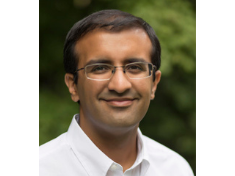-
Dr. Raj Panjabi on the Importance of Community-Based Health Systems in Pandemic Response
October 30, 2020 By Matthew Gallagher If there’s anything about responding to an epidemic, it’s that speed matters, and so does investing in people closest to the problem, said Dr. Raj Panjabi, Assistant Professor of medicine at Harvard Medical School and CEO of Last Mile Health, in this week’s Friday Podcast. The latter, he said, is the root of resilience.
If there’s anything about responding to an epidemic, it’s that speed matters, and so does investing in people closest to the problem, said Dr. Raj Panjabi, Assistant Professor of medicine at Harvard Medical School and CEO of Last Mile Health, in this week’s Friday Podcast. The latter, he said, is the root of resilience.If there’s anything about responding to an epidemic, it’s that speed matters, and so does investing in people closest to the problem, said Dr. Raj Panjabi, Assistant Professor of medicine at Harvard Medical School and CEO of Last Mile Health, in this week’s Friday Podcast. The latter, he said, is the root of resilience.
In addition to threatening immune systems, COVID-19 is a serious threat to the broader health system and to non-COVID-19 health care. Drawing on lessons from the Ebola outbreak, Panjabi said that the best system is an everyday system capable of surging in a crisis. Creating such a system would involve sufficiently funding community health workers before communities experience a state of emergency.
In the absence of existing and well-funded health systems, communities are left scrambling in a crisis and quality of care declines as a result. During the Ebola epidemic, the availability of skilled facility-based birth attendants across Liberia plummeted three-fold because health workers were becoming infected, Panjabi said. To complicate the issue further, health systems had poor infection control, and people were afraid to go to the hospital. Even in low-transmission areas, expectant mothers who believed they could get an infection from a health worker in a health center were about 50 percent less likely to go to the hospital for the birth, said Panjabi.
However, there were cases of strong community-based responses. South Africa, for instance, had about 27,000 HIV & TB community health workers who were retrained. They went on to screen more than 11 million people—about 20 percent of the population— and help detect COVID-19 at the community level in the first months of their pandemic, Panjabi said. South Africa managed to do this because it had been already investing in everyday health workers. And Liberia has improved its health systems since Ebola as well. One in two rural children with malaria are being tested and treated “by their neighbors, by community health workers,” said Panjabi.
These case studies illustrate why it is crucial that community health workers in Africa—most of whom are women from poor communities—should be viewed as invaluable employees rather than as informal volunteers. After all, investing in community health workers is not simply a health issue, said Panjabi. The COVID-19 pandemic has been a reminder that robust health systems can benefit both the economy and the security of nations, he said. Based on fiscal stimulus projections from the UN Economic Commission for Africa, Panjabi said that allocating just $2 to $4 billion of a $100 billion budget would help fund a potential pandemic health workforce that could not only help us deal with this current pandemic but help us become better prepared for the next one.
For every dollar invested in community health workers, there is ten dollars’ worth of economic return. That stimulus provides protection against the next outbreak and allows patients to lead longer, healthier, and more productive lives, said Panjabi. “But it’s also one of the fastest ways to create jobs for young people on the continent,” he said.
Editor’s Note: This article was originally titled “Lessons from Africa: Building Resilience through Community-Based Health Systems.”
Friday Podcasts are also available for download on iTunes and Google Podcasts.
Photo Credit: Photo of Dr. Raj Panjabi, courtesy of Last Mile Health.
 A Publication of the Stimson Center.
A Publication of the Stimson Center.

 If there’s anything about responding to an epidemic, it’s that speed matters, and so does investing in people closest to the problem, said Dr. Raj Panjabi, Assistant Professor of medicine at Harvard Medical School and CEO of Last Mile Health, in this week’s Friday Podcast. The latter, he said, is the root of resilience.
If there’s anything about responding to an epidemic, it’s that speed matters, and so does investing in people closest to the problem, said Dr. Raj Panjabi, Assistant Professor of medicine at Harvard Medical School and CEO of Last Mile Health, in this week’s Friday Podcast. The latter, he said, is the root of resilience.

